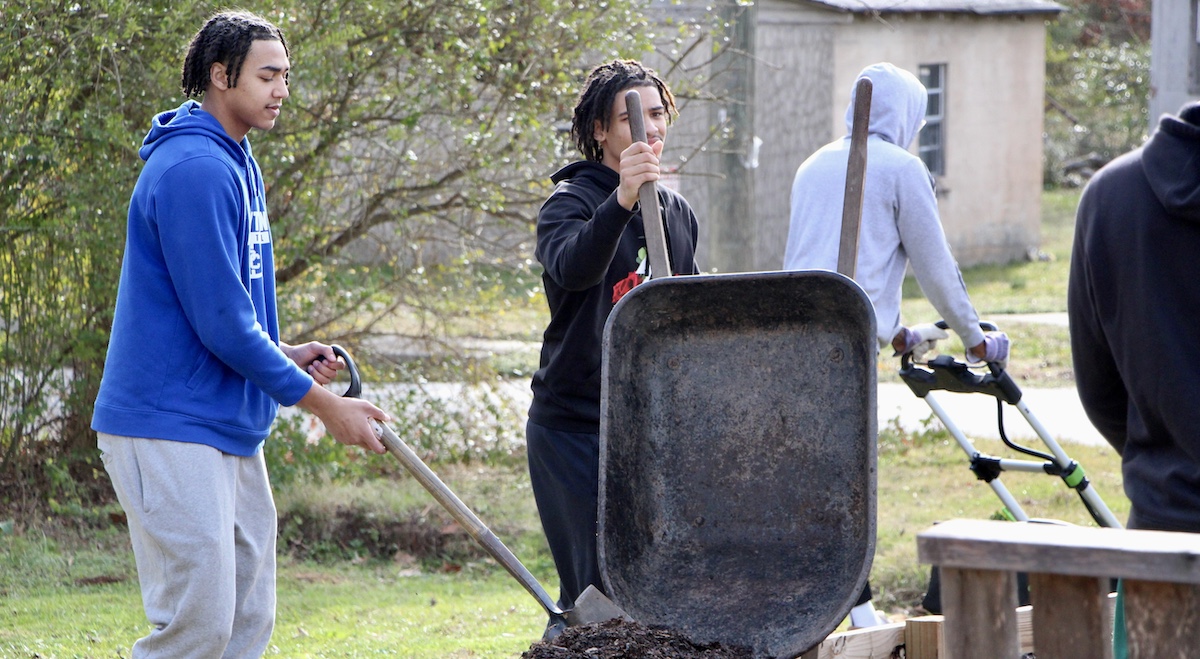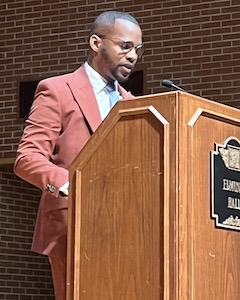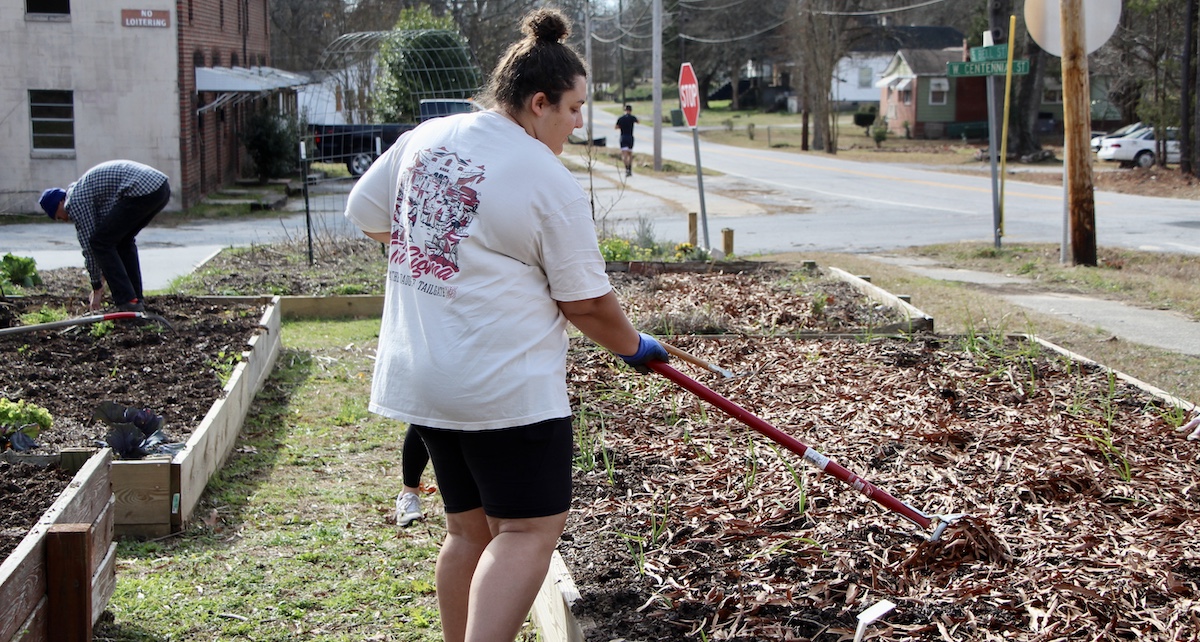Service and hope surround PC’s celebration of MLK Day ‘24

More than 100 PC students assembled at various points throughout Laurens County as volunteers on MLK Day.
Presbyterian College celebrated the legacy of slain civil rights leader Dr. Martin Luther King, Jr. by serving the Laurens County community and taking inspiration from a message of hope.
More than a hundred PC students participated in the service projects on Conway Ave. in Laurens, Clinton Canopy, the Clinton Community Garden, Springdale Methodist Church in Clinton, and the Presbyterian Home, according to Student Volunteer Services.
A group of students also attended this year’s King Day at the Dome in Columbia for a march down Main Street to the S.C. State House and speeches from U.S. House Minority Leader Hakeem Jeffries and U.S. Vice President Kamala Harris.
Students, faculty, and staff also gathered with residents for the college’s annual MLK Day convocation, where various speakers and performers delivered words of wisdom and songs of hope.
“Dr. King envisioned a world where people from all walks of life would come together in what he called the beloved community,” said PC president Dr. Anita Gustafson. “This concept is rooted in the idea that we are all interconnected, that our destinies are intertwined, and that we must strive to create a society built on love, understanding, and shared humanity.”
Gustafson said Presbyterian College is committed to building a welcoming and inclusive community made more robust by various experiences, ideas, and identities.
“Today, as we commemorate Dr. King’s dream, let us reconnect ourselves to the principles of justice, equity, diversity, and inclusion,” she said. “In the spirit of Dr. King’s beloved community, we must also acknowledge the work that is still ahead of us. As members of the PC community, we have a responsibility to engage in meaningful conversation, promote understanding, and work toward creating a just and better world.”

Derrick Quarles
Founder and CEO
Evolve Upstate
This year’s keynote speaker for MLK Day, Greenville County community activist Derrick Quarles, pointed out some of the ongoing struggles and challenges the country faces as it wrestles with issues of race and identity.
At a young age, Quarles said his life intersected with the juvenile justice system several times, leading to a period of confinement where he found his voice, his passion, and a compelling reason to transform his life into something better.
“At the age of 17, I received the Dr. Martin Luther King, Jr. Community Initiative Award, the very first award I ever received,” Quarles said. “And to be truly honest, I had not anticipated the work that I was involved in would lead to such a recognition. A little bit after this moment marked the beginning of my journey to advocate for those who struggle to find their voice. My dream was to become a psychiatrist. I wanted to make a difference, having felt the impact of these illnesses in my own life.”
But life threw Quarles a curveball, he said, when 17-year-old Trayvon Martin was shot and killed by George Zimmerman in Florida in 2012.
“It wasn’t just a distant headline,” he said. “It felt like I was watching my own life body lying on that street. It moved me enough to change my major from pre-med to political science and criminal justice because the burning desire to help didn’t fade. It evolved into a commitment to make a difference through policy. Thus, I stand before you today as a two-time White House invitee. I’ve worked on over 40 political and issue-based campaigns across the country.”
Quarles outlined the critical principles of King’s philosophy of non-violent protest.
“The first one is nonviolence is a way of life for courageous people,” he said. “The second is the beloved community is the framework for the future. The third is that we should attack forces of evil, not persons doing evil. Number four, accept suffering without retaliation for the state of the cause to achieve a goal. Number five, avoid internal influence of the spirit as well as external physical violence. And the last thing is that the universe is on the side of justice.”
Quarles said MLK Day is often when politicians, law enforcement officials, and authority figures remind others of King’s philosophy of nonviolence. But what they omit, he said, are the underlying things he protested about – ending racism, poverty, militarism, and injustice.
Quarles reminded those gathered to honor King that despite the many civil rights victories that have been scored since the beginning of the movement in the 1950s, the fight to eradicate racism, poverty, and militarism rages on.
“Corrective justice remains an elusive goal for many black individuals, as well as those who are struggling with poverty and low income,” he said. “We want to believe in Dr. King’s principles of kinship, not violence, but many are asking how long we continue to believe when the reluctance for education and justice will ever be on our side.
“How many more black boys will not make it home from the store after purchasing iced tea and Skittles? How many more black boys will sit in the backseat of their friend’s car listening to loud music at a store and being shot by a privileged white man who didn’t like their music? How many times do you sit back idly while a police officer pins his knee in the neck of a black man who simply wanted and cried out for his mother?”
Still, Quarles said he holds onto hope.
“When I look around this room this evening, I feel just like Dr. King when he said, with this faith, we will be able to hew out the mountain of despair,” he said. “The same hope that sustained Dr. King when his body sat in the Birmingham jail for eight days. The hope that empowered Mamie Teal, the mother of Emmett Till, to show the world what America was like. It’s the very hope that motivated Lucy McBeth, the mother of George Davis, to run for Congress and secure a victory in a district that historically elected only white officials.”
Quarles said hope must also drive each person to participate actively in the work of equality and equity for all.
“As we reflect back to the universe being on the side of justice, I want to invite you to join us on this journey,” he said. “Be intentional about studying the critical issues we face as a nation, even on your college campus.
“Advocate for justice, equality, and human rights on this campus, but don’t stop there. Take your advocacy to the streets. Engage in uncomfortable conversations that might change the way someone in your circle thinks. Show up at protests and rallies. Speak out at public forums and collaborate with friends to create a powerful movement for justice and equality. This is not a call to action, but I am sounding the trumpet for action. This is an opportunity for each of you to become architects of change.”
Dr. Selina Blair, PC’s Rogers-Ingram Vice President for Justice, Equity, Diversity, and Inclusion, also challenged the community to get involved and make a difference.
“You are the ones who are going to really make a difference in this world today,” she said. “You are the ones who are going to execute Dr. Martin Luther King’s dream.”

